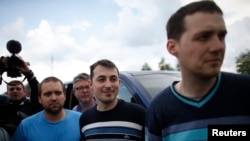Pro-Russia militants in Ukraine's eastern city of Slovyansk on Saturday released a team of European military observers held captive for more than a week.
The observers, sent by the Vienna-based Organization for Security and Cooperation in Europe to monitor security and human-rights conditions in the restive area, had been seized April 25 in Ukraine's flashpoint town of Slovyansk. Insurgent leader Vyacheslav Ponomarv, the self-described "mayor" of Slovyansk, told the Associated Press all seven OSCE observers and their five Ukrainian assistants were freed on Saturday.
Ponomarev was quoted by the Russian news agency Interfax as saying he ordered the team's release because of rising instability in Slovyansk. But he later told the AP that "they are not being released. They are leaving us, as we promised them."
Russia had sent a special representative, Vladimir Lukin, to help negotiate the release. In a statement Saturday, Russia's Foreign Ministry said the captives' release was "evidence of the bravery and humanism of the defenders of the town. They showed in the first place concern about the security of foreign citizens."
U.S. Secretary of State John Kerry welcomed the team’s release but called for more efforts to calm the crisis.
Kerry said he spoke by phone with Russia's Foreign Minister and Sergei Lavrov and that both would discuss with OSCE officials how the organization might "play a larger role in perhaps facilitating the de-escalation."
German Col. Axel Schneider, one of the freed captives, told the AP all 12 detainees had held up relatively well.
"They had a very good attitude," giving them the strength to withstand captivity, Schneider said.
He said Ponomarev had promised the captives would be treated humanely. "We have been treated as good as possible," Schneider said. "This is a miserable situation, but we were under his protection."
U.N. Secretary-General Ban Ki-moon also welcomed the freeing of the observers. In a statement, Ban's spokesman said the U.N. chief expresses his appreciation to all who helped facilitate the release, including Russia.
The Associated Press and Reuters contributed to this report.
The observers, sent by the Vienna-based Organization for Security and Cooperation in Europe to monitor security and human-rights conditions in the restive area, had been seized April 25 in Ukraine's flashpoint town of Slovyansk. Insurgent leader Vyacheslav Ponomarv, the self-described "mayor" of Slovyansk, told the Associated Press all seven OSCE observers and their five Ukrainian assistants were freed on Saturday.
Ponomarev was quoted by the Russian news agency Interfax as saying he ordered the team's release because of rising instability in Slovyansk. But he later told the AP that "they are not being released. They are leaving us, as we promised them."
Russia had sent a special representative, Vladimir Lukin, to help negotiate the release. In a statement Saturday, Russia's Foreign Ministry said the captives' release was "evidence of the bravery and humanism of the defenders of the town. They showed in the first place concern about the security of foreign citizens."
U.S. Secretary of State John Kerry welcomed the team’s release but called for more efforts to calm the crisis.
Kerry said he spoke by phone with Russia's Foreign Minister and Sergei Lavrov and that both would discuss with OSCE officials how the organization might "play a larger role in perhaps facilitating the de-escalation."
German Col. Axel Schneider, one of the freed captives, told the AP all 12 detainees had held up relatively well.
"They had a very good attitude," giving them the strength to withstand captivity, Schneider said.
He said Ponomarev had promised the captives would be treated humanely. "We have been treated as good as possible," Schneider said. "This is a miserable situation, but we were under his protection."
U.N. Secretary-General Ban Ki-moon also welcomed the freeing of the observers. In a statement, Ban's spokesman said the U.N. chief expresses his appreciation to all who helped facilitate the release, including Russia.
The Associated Press and Reuters contributed to this report.





